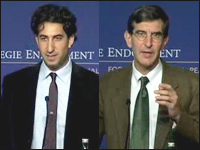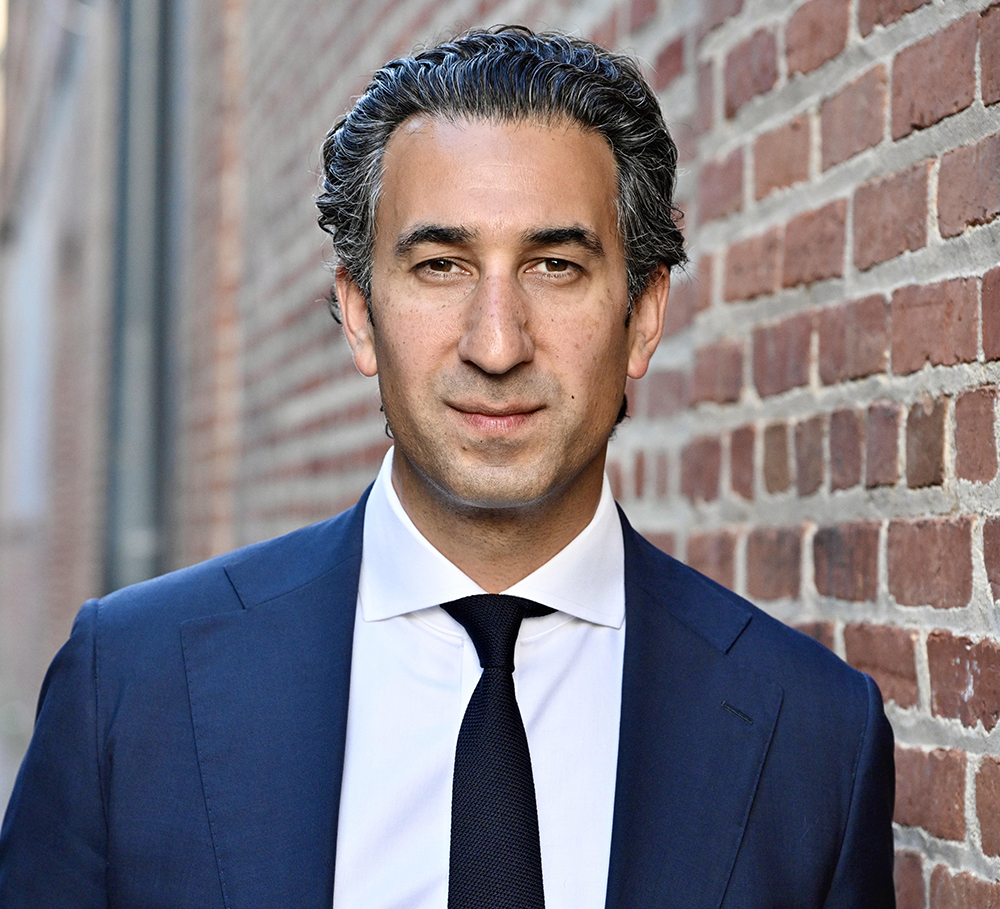{
"authors": [
"George Perkovich",
"Karim Sadjadpour"
],
"type": "event",
"centerAffiliationAll": "",
"centers": [
"Carnegie Endowment for International Peace"
],
"collections": [],
"englishNewsletterAll": "",
"nonEnglishNewsletterAll": "",
"primaryCenter": "Carnegie Endowment for International Peace",
"programAffiliation": "",
"programs": [
"Nuclear Policy",
"Middle East"
],
"projects": [],
"regions": [
"North America",
"United States",
"Middle East",
"Iran"
],
"topics": [
"Security",
"Military",
"Foreign Policy",
"Nuclear Policy",
"Nuclear Energy"
]
}
Strategic Engagement with Iran: Steps for the Next U.S. President
Thu, October 16th, 2008
Washington, D.C.
The next president must revise Washington's approach to Iran if the United States hopes to halt Iran's enrichment activities and address Iran's role in other issues of critical importance to the United States. In a discussion held at the Carnegie Endowment, George Perkovich and Karim Sadjadpour suggested steps the next U.S. administration should take to strategically engage Iran.
Productive Engagement
Sadjadpour laid out six issues in which Iran is critical to U.S. foreign policy interests: Iraq, Afghanistan, nuclear proliferation, the Arab-Israeli conflict, energy, and terrorism. He stressed that due to deep-seated mutual mistrust and hostility, a "Grand Bargain" to resolve all issues in one fell swoop is unrealistic; rather, the United States should attempt to build confidence with Iran on areas of overlapping interest, such as Iraq and Afghanistan. It is essential for the next U.S. president to probe whether a different approach could beget constructive changes in Tehran’s strategic outlook.
Nuclear Impasse
The United States does not now have sufficient leverage to induce Iran to halt uranium enrichment activities, argued Perkovich. Ideally, the U.S. and its diplomatic partners could physically eliminate Iran's capacity to produce fissile materials for nuclear weapons, but that option does not really exist, and the consequences of trying could leave the world worse off. For diplomacy to have a chance of success, the U.S. and its UN Security Council peers and Germany must change the psychology of negotiations with Iran. Perkovich proposed a revised strategy towards Iran:
- A Final Offer: Give Iran one last, time-limited chance to demonstrate it is willing to negotiate temporary suspension of its fuel-related activities in return for exceptional offers of peaceful nuclear and trade cooperation and security confidence-building.
- Break Off Nuclear Negotiations: If Iran refuses to actually negotiate, the international community should tell Iran it understands "no," and withdraw the incentives it has offered. Efforts should be focused on maintaining and strengthening international sanctions, while taking force off the table as long as no evidence emerges from the IAEA that Iran is weaponizing.
- Fortify the International Redline: Clarify within the UN Security Council what sanctions would be applied if Iran undertakes new weaponization activities, further violations of nonproliferation obligations, or withdrawal from the NPT. This should include authorization of limited military strikes against specific nuclear facilities and activities violating UN resolutions.
- Clarify That Iran Would Not be Punished for Coming Clean: If Iran provides information to resolve the International Atomic Energy Agency's outstanding questions about suspicious nuclear activities, it should be assured that such information would not be used to seek additional sanctions or to justify military action.
Questions & Answers
During the question and answer session, participants inquired whether engagement threatens to legitimize Ahmadinejad and his foreign policy strategy before Iran's June 2009 presidential elections. To avoid such an outcome, Sadjadpour emphasized quiet diplomacy and urged the United States to refrain from any grand overtures prior to the elections. U.S. policies that facilitate, rather than impede, Iran's modernization and reintegration in the global economy over the long-term are important in undermining Tehran's hardliners.
A second set of questions challenged Perkovich's recommendation of changing the U.S. redline from enrichment to weaponization. Perkovich admitted that enrichment is "unacceptable," but that does not mean the U.S. or others have the power to stop it. He argued that the potential ambiguity between enrichment and weaponization cannot be allowed to paralyze collective action. The international community needs to focus on defining the consequences of weaponization and better prepare its response in case of a breakout by Iran.
Carnegie does not take institutional positions on public policy issues; the views represented herein are those of the author(s) and do not necessarily reflect the views of Carnegie, its staff, or its trustees.
Event Speakers
George Perkovich is the Japan Chair for a World Without Nuclear Weapons and a senior fellow in the Carnegie Endowment for International Peace’s Nuclear Policy Program. He works primarily on nuclear deterrence, nonproliferation, and disarmament issues, and is leading a study on nuclear signaling in the 21st century.

